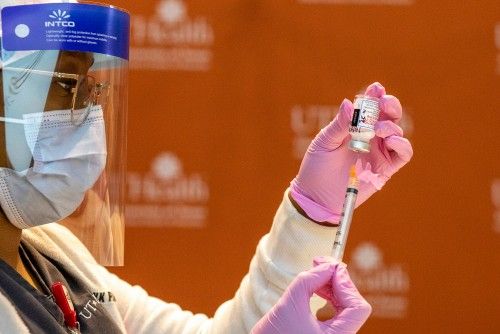A nurse with UT Physicians administers a dose of the COVID-19 vaccine. Photo by UTHealth Houston
New research focused on Texas nurses has found predictors of a lack of intention to be vaccinated against COVID-19 includes previous COVID-19 infection, unfavorable vaccine attitudes, and concerns about vaccine safety. Researchers from Cizik School of Nursing at The University of Texas Health Science Center at Houston (UTHealth Houston) published the results in the October 2021 issue of the Texas Public Health Journal. The study assessed Texas nurses’ COVID-19 vaccination status, intention, and hesitancy through self-reported results via an online survey in early 2021.
Within a sample of 311 nurses, 12% of respondents stated they did not intend to receive the COVID-19 vaccination. Predictors of no intention to vaccinate included previously testing positive for COVID-19, less favorable vaccine attitudes, and greater concerns related to vaccine safety. A 2021 survey by the Kaiser Family Foundation reported 14% of American adults did not intend to receive the COVID-19 vaccine.
Lead author Sandra Branson, PhD, MSN, RN, associate professor in the Department of Undergraduate Studies at Cizik School of Nursing at UTHealth Houston, believes misinformation contributes to the low vaccination rate, and continued education on the vaccine for both nurses and the general public may help boost vaccine uptake.
“You don’t see a lot of people sharing vaccination information to people who have been previously infected with COVID-19,” Branson said about nurses who have had COVID-19 and do not intend to be vaccinated. “We don’t yet know how effective natural immunity is against the virus; however, evidence is emerging that you are better protected by being vaccinated.”
Branson and the study’s co-investigators also found that 4.2% of nurses intended to vaccinate, and 83.6% had already received the vaccine. The population surveyed provided an almost equal representation of nurses across major metropolitan hubs in Texas. One quarter (25.1%) of respondents were employed in Houston. Austin and Dallas made up nearly half the population with 22.8% and 22.5%, respectively. Other cities and regions made up 29.6% of respondents.
This study comes at a critical time, as reports of nursing workforce shortages increased during the COVID-19 pandemic. Experts point to burnout and an aging workforce as key factors fueling the shortage, and a pre-pandemic survey in the Journal of Nursing Regulation predicted a shortage of 151,000 nurses by 2030.
Branson hopes the recent full approval of the Pfizer vaccine will help nudge those who are on the fence about vaccination.
“With any new development, there are early adopters, those who come later, and those who will never adopt.” Branson said. “Some nurses will decide to get vaccinated later, but there will still be those who will never vaccinate. Some people will get vaccinated based on their perceived risk of getting COVID, or their loved ones, or they will eventually believe that the vaccine is safe and effective. I believe that caring conversations with the skeptical group will be the best approach to improving uptake. The wrong conversations can get people entrenched in not getting vaccinated.”
Co-authors from Cizik School of Nursing include Barbara Hekel, PhD, MPH, RN. Other co-authors include Eunjung Lim, PhD; Alexandra Michel, PhD, RN/CNM; Deborah Mattheus, PhD, RN/NP; and Gregory Zimet, PhD, of the University of Hawaii at Manoa. Holly B. Fontenot, PhD, RN, NP, of Indiana University School of Medicine, also contributed to the study.
Source: University of Texas Health Science Center at Houston
